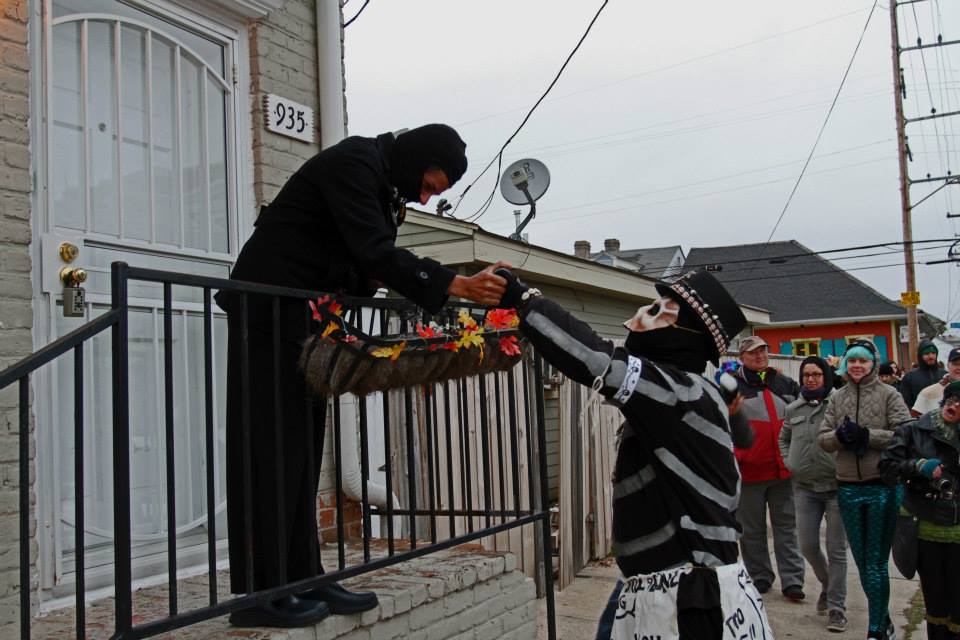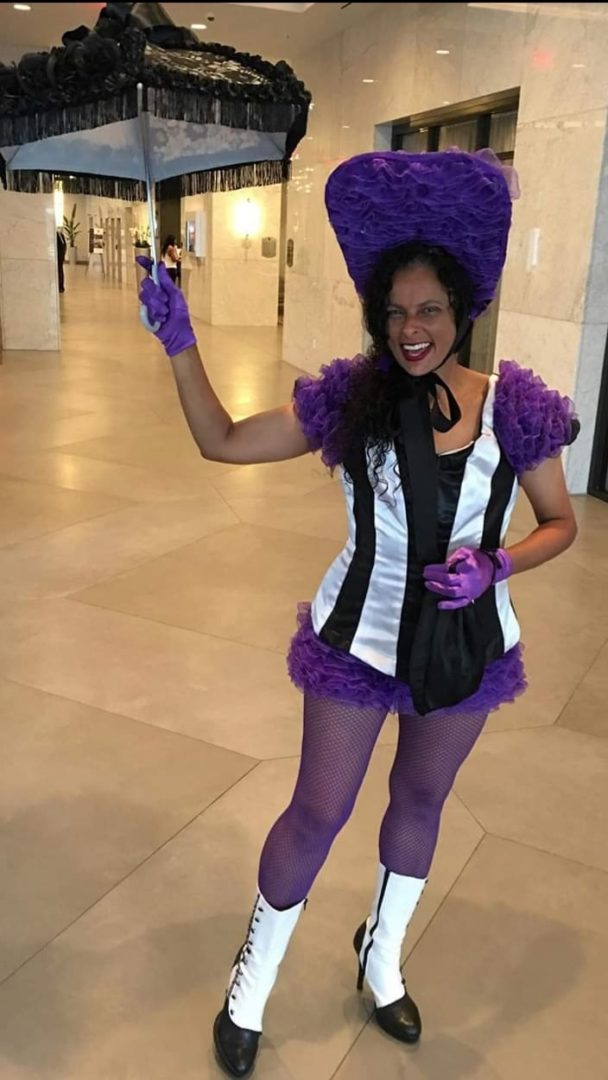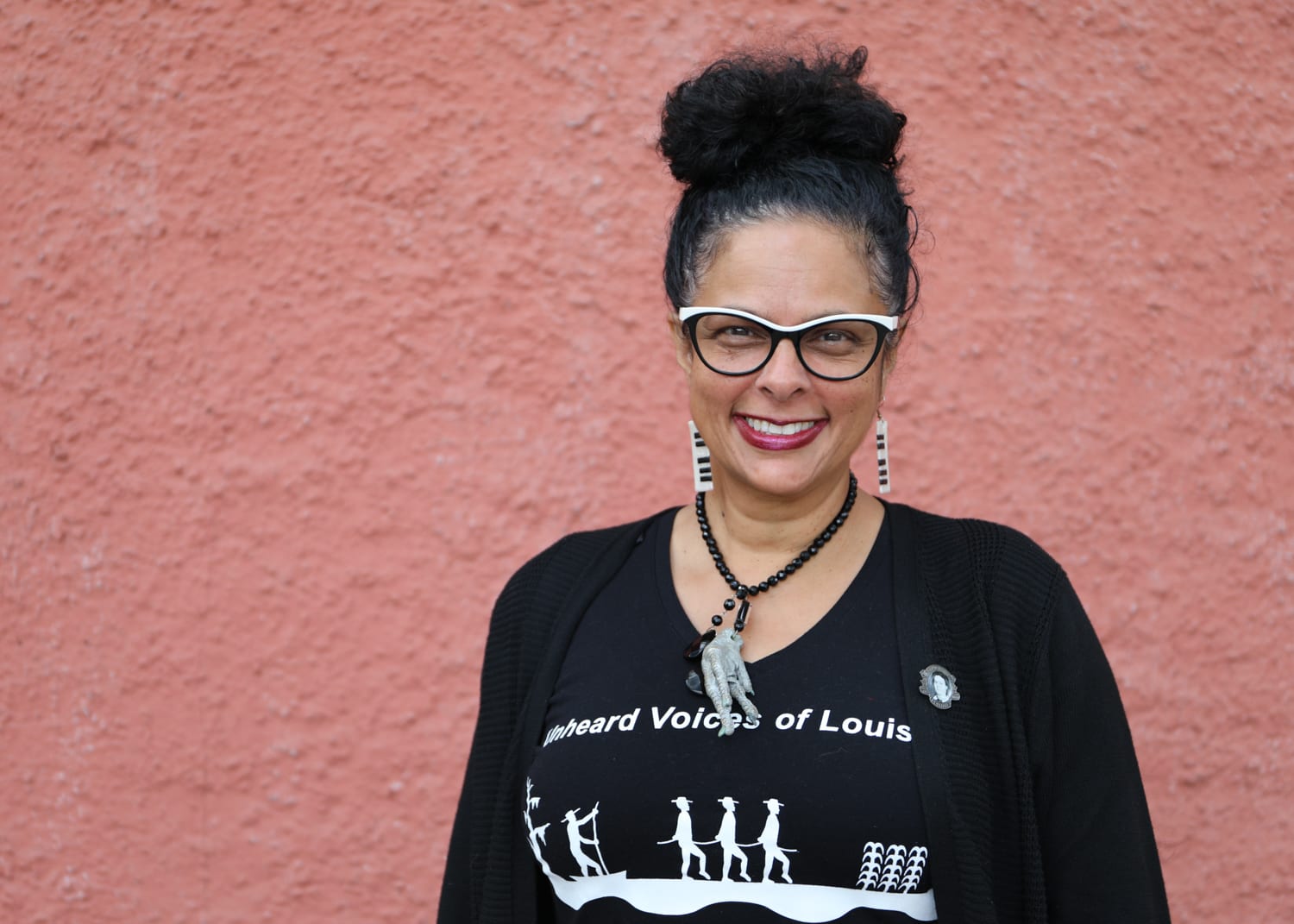There are few people as suitable to tell the tales of New Orleans as Dianne Marie Honoré. The history of the region is literally in her blood: a descendant of the storied Honoré and Destrehan families of Louisiana, she’s able to trace family back to Haiti and the Elmina Dungeon in Africa, as well as to white plantation owners. Between this robust blend of heritage and her excellent skills in the kitchen, it’s easy to see how fitting her nickname ‘”Gumbo Marie” is.
But any cultural authority that came to Dianne as a birthright of sorts has been exponentially enhanced by years of pointed work and research — and also, like Joan of Arc — whose parade Honoré marches in at the onset of Carnival season with her Amazon sisters — by following the voices in her head encouraging her to keep the fire of New Orleans tradition burning. Dianne is a tour guide, an instructor at the New Orleans Culinary School, a practitioner of both voodoo and Catholicism (like her great aunt, who taught her the voodoo ways, she does not consider the two to be mutually exclusive), and the founder of a number of organizations aimed at illuminating aspects of Louisiana culture that have either been forgotten or are at risk of being forgotten.
Returning to her roots
“I was born to do this”
During Carnival, perhaps the most important hat this busy woman wears is that of the leader of the two Downtown walking krewes that she started in 2012 and 2013: the Amazon Benevolent Society and the Black Storyville Baby Dolls, respectively. Carnival was always a special time for Honoré growing up. She remembers the steady stream of festive folk coming through her parents’ Sixth Ward Creole restaurant, a beautiful angel costume her mother made for her as a young child, the excitement of venturing down to Canal Street to catch the big parades, and the even greater excitement of catching Black Masking Indians out on the streets during a time when they remained a bit more reclusive.
As with so many others, August 2005 changed everything for Dianne. She remained in the area for a few weeks after Hurricane Katrina to lend her nursing skills to the desperate relief effort, but eventually relocated to Dallas, where her parents moved with her daughter after the storm. When she’d fly back to New Orleans from Dallas in the years that followed, she remembers peering through the window and feeling the distinct desire to “wrap her arms around” a city she hardly recognized in its devastation.
Come 2009, her daughter was college-bound and Dianne could fight the urge to return to her roots no longer. New Orleans had resisted, once again, being washed away. Honoré knew the significance of the knowledge that had been passed down to her over the years; that if anyone could ensure New Orleans’ history and culture not be washed away either it was her. When reflecting on this period in her life, she echoed Joan of Arc again.
“I was born to do this,” she said. “It was just a huge shot in the arm of, ‘This is disappearing, you better do something.’”

She moved back to the Tremé neighborhood, doubled down on her cultural preservation efforts as a historic interpreter, became a tour guide once again, and, of course, participated in Carnival as a member of the Krewe of Red Beans and supporter of friends in Indian and Skull and Bones groups (to name a few).
Acts of bravery
But everything changed yet again for Gumbo Marie in 2012, when she was diagnosed with breast cancer. After pulling in $800 at a breast cancer bake sale she organized to benefit the American Cancer Society, she was galvanized to take her efforts a step further by organizing a support group, which she did with a Facebook post accompanied by an image of a Grecian warrior woman. Forty people showed up to the first meeting in November 2012, and by early 2013 this support group had become the Amazons Benevolent Society.
The Amazons don’t smile. They are not here to be cat-called, or present any soft image of femininity. They march along with 21-inch swords and armor — including an evocative breastplate — made from the same steel used in airplane construction. Among them you’ll find women across the spectrum of age and race. Many are breast cancer survivors; many others are there for support. They’re trailed by their badass all-female drumline. Men can join the krewe as Scythians, who march in tunics with no armor.
For maximum inclusivity, dues are kept low in the Amazon Benevolent Society. The main requirements are that members perform some type of community service once a month, and that they participate in the yearly bake sale Honoré has organized since that first successful stint in 2012. There are also monthly support group meetings, for breast cancer, but also any other issues or ailments the members may be facing. In addition to the Joan of Arc parade, the Amazons can be found marching in their own Lundi Gras procession through the Tremé.
Perhaps riding high off the success of the Amazon Benevolent Society’s first Carnival, Honoré challenged herself to another act of bravery shortly thereafter: becoming a Baby Doll after having undergone a double mastectomy. There are around a dozen Baby Doll organizations, participating in a tradition that dates back to 1912 when women had previously been excluded from parades, or participated in a subservient way. Where Amazons are a vision of stoicism and warrior strength, Baby Dolls use different — almost ironic — imagery to convey their tenacity. Baby Dolls dress as young girls in bright satin outfits, while incongruously strutting around with cigars in their mouths as a symbol of their toughness. While she appreciated the camaraderie and being welcomed into the tradition by her elders, Honoré took issue with some of the practices she saw many of the Baby Dolls engaging in — namely, watering down the impact of their appearances by appearing at everything.
She also saw an opportunity to shed light on the history of an important neighborhood in town, a neighborhood where Louis Armstrong had grown up, where she said black women were cast to the lowest rungs of society and denied any advantages society had to offer, but also required to make a life for themselves and their families (often through sex work). The neighborhood, comprised of the blocks around present-day City Hall, was known as Black Storyville. And so the Black Storyville Baby Dolls were formed. Honoré admits to ruffling a few feathers by breaking away to start her own group as she did, but she’s proud to have created an organization she believes holds the Baby Doll tradition to a higher standard, with everything from their outfits (whose materials she purchases in-person from New York each year) to their community participation.

This year, the Black Storyville Baby Dolls will appear at the Danny Barker Festival at the Jazz Museum and march in the Krewe Delusion parade. Closest to Gumbo Marie’s heart will be when she and her Baby Dolls get out at dawn on Mardi Gras to begin the day in prayer for her city: along with her voodoo and Catholicism, Honoré attests that upholding the traditions of her people during the Carnival season is a positively spiritual experience, as well.







